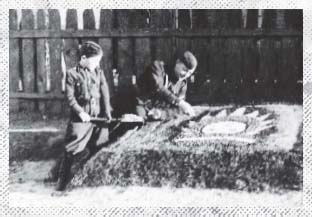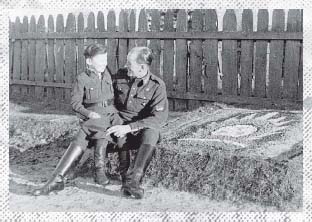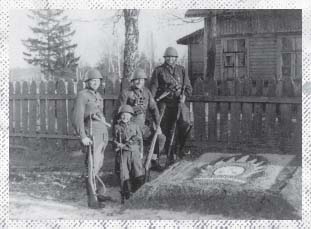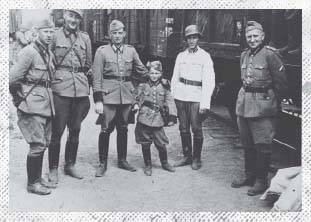The Mascot (35 page)
Authors: Mark Kurzem

The question was answered almost before I had formed it.
By the time my mother and father arrived late the following week, another surprise was in store for me.

My father with Sergeant Kulis, tending the floral insignia of the Latvian SS at Volhov, near the Russian front, autumn 1943.
Â

My father with Sergeant Kulis at Volhov, autumn 1943.
Â

My father with other soldiers from his troop, Volhov, 1943.
Â

The mysterious photograph that my father retrieved from Daugavas.
Â
A sympathetic letter from an elderly woman had reached my father the day before he had left for Oxford. It was from Ventspils, a regional city in northwestern Latvia. She made no mention of how some enclosed photos came to be in her possession, only that she felt my father should have them.
He passed me the envelope. It contained a series of three photographs of my father in his SS uniform in the company of his “rescuer,” Sergeant Jekabs Kulis. The sergeant and my father were pictured tending what initially seemed to be a small garden plot in a camp. My father told me that it had been taken at the barracks in Velikiye Luki, south of Leningrad. It must have been in the autumn of 1943, before Lobe sent him back to Riga for trying to escape from the front.
“Look,” he said, placing the tip of his index finger closer to the flowers. They were arranged to depict the emblem of the Latvian SS.
Troubling as these images were, they did not have as disquieting an effect as the photograph I had been waiting to see: my father posing with pistol and rifle slung over his shoulder in the midst of other members of the Eighteenth Battalion.
Despite the slight physical menace that hovered in the background, I felt optimistic for the first time since my father's visit to Oxford. From nothing at all we'd unearthed a village where my father might have spent the first five years of his life. And we had made first contact with a man, Erick Galperin, who might turn out to be his half brother.
These were joyful discoveries, but they were tinged with sadnessâa haunting reminder of what had been lostâbrother, sister, mother, father, aunts, grandparents, unclesâeveryone who made little Ilya who he was.
KOIDANOV
O
ur plane circled above Minsk airport, waiting for permission to land. As we descended, we saw a number of planes dotted around the perimeter of the main runway, many of them rusty and dilapidated, and all partly dismantled for their spare parts.
Erick Galperin was waiting for us in the arrivals terminal. He was modestly dressed in a suit that matched my father's but had seen better days. He stepped forward shyly to greet my father and then presented my mother with flowers. There were numerous introductions to be made. My father introduced me to Erick and his wife, Sonya, who in turn introduced us to their children, Dimitri and Irena, likely my cousins.
Matters grew more confusing as we were then presented with a procession of individuals who all claimed to be distantly related to my father. An elderly woman named Luba, an English teacher from a town near Minsk, introduced herself to my father as “your father's wife's cousin's daughter.” My father smiled politely, but there was a glimmer of amusement in his eyes as he leaned across and whispered to me, “God forbid. What have you gotten me into?”
“No,” I countered, “this is your family. You got me into this!”
When our entourage finally exited to the forecourt, we were faced with our transportation for the visit: an old blue minibus decorated with polka-dot curtains, plastic flowers, and party lights flashing on and off in what seemed to be a gesture of welcome.
The driver stood proudly next to the rear door and with a wave of his hand beckoned us to climb on board. The interior was also decked out in vivid blue and was smothered in the overpowering scent of air freshener. My mother retched involuntarily.
Seated toward the rear of the van was a young woman in her early twenties who was chewing gum. She was a bottle blond and wore wraparound dark sunglasses. “Hello,” she said in languorous English. “I am Natasha, a friend of Erick's and your interpreter. I've been waiting for you.” She peered over the rim of her sunglasses and continued to chew gum as she offered us her hand.
With a slight pop from the exhaust, the bus moved forward jauntily onto the highway to Minsk. The road was deserted for the entire journey, apart from an occasional horse and cart moving slowly along its dusty shoulder. Erick, speaking Russian, pointed out sights to us en route as Natasha, acting as sultry as she could, gave desultory and dubious interpretations of Erick's words. My mother held her hand her hand above her face and rolled her eyes at me. This very serious visit was becoming more surreal by the moment.
As we entered downtown Minsk, we were rescued from Natasha's commentary by the driver, who turned on the sound system. In an instant, the van was transformed into a mobile disco as Russian pop blared out through loudspeakers, as if to announce our arrival to the population of Minsk. Judging from the reactions of people we passed by the side of the street, Minsk knew we were thereâpedestrians turned to see where such a racket was coming from, and when they spotted the bus, they pointed at us and burst out laughing.
We eventually stopped in front of a vast, run-down Soviet hotel. A flashing neon sign spelled out
HOTEL PLANETA AND CASINO
in bright red letters.
“It looks more like a brothel,” said my mother.
We checked in, and with Erick's help found our rooms. Our floor was guarded by a large elderly woman, the perfect babushka. Ensconced on a sofa opposite the elevator doors on our floor, she was the first of many such porters we would meet. She gave us an appraising look, nodded dourly, and returned to her knitting.
The next morning I rose early for our journey to Koidanov, which lay about twenty miles to the southwest of Minsk.
I made my way down to the foyer and spotted my father standing at the hotel's panoramic window, gazing at the view of downtown Minsk in the near distance, a scape of low-lying buildings, mostly modern but punctuated by the odd Soviet monument and the occasional prewar construction that had survived the devastation of the German invaders.
Nearby I saw Erick standing with my mother and an attractive, vivacious woman. “I'm Galina,” she said. “Your new interpreter.” I was surprised. She explained that she was to replace Natasha, our Mata Hari from the previous evening. Natasha had been “fired” and, mysteriously, no explanation was forthcoming. (Later I cornered Galina to find out the reason, and she had merely said the word “vodka” and mimed swilling from a bottle.)
Galina turned out to be an excellent replacement. Quite the opposite of Natasha, she didn't chew gum or wear dark glasses. There was nothing of the vamp about her. She was forthright and spoke flawless and idiomatic English.
As we walked toward the bus, I saw the driver lean into the front cabin and turn on the flashing roof lights. He then looked at us gleefully, giving us a thumbs-up sign and hoping for our approval. We embarked, the engine rattled loudly, and with a few jerks we took off into the traffic.
After ten minutes or so on a narrow highway, we came to a turnoff with a battered sign:
DZERZHINSK 14
. As we drove through the industrial sprawl on its outskirts, it seemed merely to epitomize a drab, industrial Soviet town. And with its expanse of gray concrete public housing it was clear that Dzerzhinsk had expanded since the war.
“Not far now,” Erick declared as we wound our way through streets. Then, without warning, we came upon an enclave of old, colorfully painted wooden houses with carved shuttered windows on half-paved streets. “This neighborhood was the village before the war,” Galina translated for Erick.
I glanced at my father: he was staring out of the window pensively, his hand held to his cheek. This gesture was to become habitual during our journey. At other times, however, he would withdraw into himself, holding his hand to his cheek, only to reemerge moments later either claiming or rejecting what he had just seen as part of his own past.
“Dad?” I whispered, lightly touching his arm. I didn't want to startle him.
He didn't respond.
My mother gently grasped his elbow so that he snapped out of his dreamlike state. His eyes were intensely blue and alive with curiosity.
“Do you recognize anything?” my mother asked.
My father shook his head. “Not anything specific, but it all seems very familiar.”
Erick leaned across to the driver, shouting instructions for him to pull over. He jumped out of the rear of the minibus and beckoned us all to join him on the deserted street. It was midmorning and the houses were closed up, but when I turned around unexpectedly I saw several curtains twitch. Our arrival had not gone unnoticed.
Erick looked at my father.
“This is the street you grew up on,” he said. “October Street.”
My father turned slowly in a circle, again lightly touching his cheek. “I just don't know,” he said.
Erick grasped my father's hand and led him two houses farther down the street. We followed. “You grew up in this house,” Erick stated emphatically, pointing at the house in front of us. There was little to distinguish this house from any of the others in the row.
“Here?” My father was surprised.
Erick nodded his head several times.
My father was silent as he examined the exterior of the house. He approached the front fence and stared even more intently at the building before him.
Erick joined my father. “Your home!” I heard Erick insist.
My father turned to my mother and me. He gave a shrug, looking bewildered, and came over to us.
“I don't remember this place,” he said in a dispirited tone.
“Perhaps it's been altered,” my mother suggested.
“That's right,” I added, trying to sound encouraging.
But my father remained doubtful. “I don't remember,” he repeated.
Erick must have sensed the gist of our exchange because he became slightly agitated and began to repeat “your house” over and over. His insistence only confused my father even more so that he retreated into himself, uttering in a low voice, “My home was different. It had a drive down one side where my father had a cart and next to that there was a shed where he worked and the apple tree that I used to climb. I remember that clearly.”
His recollection made him more resolute. “No,” he said. “This is not the house I grew up in. It's the wrong house.”
“Are you absolutely sure, Dad?” I asked.
“Absolutely,” he said slowly.
I was disappointed for my father and for all of us, but I admired his faith in his own memories and his refusal to yield to the incredible pressure we all felt to confirm Erick as his half brother.
Everybody remained still, waiting for him to make the next move. My father shook his head and looked away from the source of his disappointment. I watched as he crossed to the other side of the street. With a subtle nod he beckoned me over.
“I must be a Panok after all,” he said with finality. “Not a Galperin. I hoped for all our sakes that this would work out. We'll have to start all over again.”
I felt grim but my father didn't seem to notice. He was immersed in his own train of thought.
“What can I say to Erick?” he said with compassion in his voice. “He was so happy to find he had a brother. Did you see his face? This will break his heart.”
And I had seen my father's face. Despite his reservations, I knew that he, too, had hoped that some of his early childhood might be returned to him.
Something had to be done to salvage the immediate situation. We couldn't simply turn around, get back in the van, and with a brief apology make a quick exit from Belarus.
I returned to Erick, who was still waiting in front of the house. “You grew up here after the war?” I asked through Galina.
“Yes,” Erick replied, shifting on the spot and not looking at me. I wondered what the matter was and then immediately reprimanded myselfâhe must have been as disheartened as my father.
“Your father didn't change houses when he came back from the war?” I persisted.
“No,” he retorted, now slightly belligerent and pointing at the house. “He returned to this house where I was born.”
“When did your father sell it?”
“In the early seventies, when he got sick. He came to live with us in Minsk until he died.”
“Who lives there now?”
“I don't know,” Erick replied. The glimmer of a scowl crossed his face. I decided to let the matter drop, partly because my father was now moving slowly along the street, looking in all directions. His expression changed, becoming more alert. He stopped. He had seen something that the rest of us could not.
“Over there seems familiar,” he said, pointing farther up the street.
My father headed off toward an intersection, where he again came to a stop. He turned to look at us. “I know this,” he said about the intersecting street. “It goes down to the village hall, I am certain of it.”
My father smiled broadly. “I remember the hall,” he said. “That's where I went to see a film one time, when a traveling show came to town. I went with another boy, my friend. We walked down the hill together, hand in hand. I can't see his face or remember his name. But I do remember that my father tossed me a few coins for an ice cream from the man who stood in front of the hall. That was the first time I ever tasted ice cream.”
My father forged ahead. A few yards farther into that street we came to another intersection. My father stopped dead in his tracks. We waited in silence.
“This is the way the soldiers⦔ he said, staring down the path before him. There was no need to complete the sentence. He was visibly shaken, but after several moments he seemed to gather himself. With a wave of his hand, he motioned for us to follow him and set off quickly along the path. We hastened after him.
About two hundred yards farther along, the path opened up into a grassy space about the size of a football field.
“That's where it happened,” he said in a low voice.
My father led the way forward, but he had lost his vigor. He walked with trepidation, almost tiptoeing, as if he were creeping up on the scene from over fifty years ago and he did not want the soldiers to notice him.
He turned at one point and summoned us to keep up as if we were reluctant tourists who had suddenly lost their taste for the journey ahead and begun to dawdle.
But there was no going back.
He came to a stop. His eyes were empty, and he had forgotten that we were standing right beside him. He appeared to recognize a topography from the past and began to make comments aloud, as if confirming what he saw to another person.
“Yes,” he said. “This is it⦔
He looked back up the path he had just taken. “It's strange,” he said, suddenly becoming aware of us. “I remember being led down that path toward the soldiers. But it was steeper before, so I could see what was happening ahead of us. I was holding my mother's hand and my little brother's as well. But I'm confused. I was with them, but I didn't go to my death with them. Something must have happened to have stopped the executions that day, but for the life of me I have no memory of what it was.”
